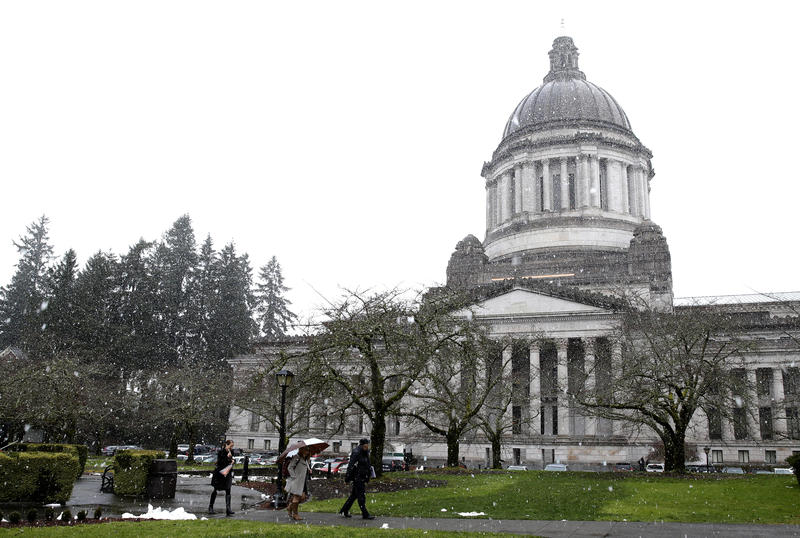
What Passed, What Didn’t In 2020 Washington Legislature (Hint: Coronavirus Changed Plans)
READ ON
What a difference 60 days makes. When Washington lawmakers arrived in Olympia in mid-January for a short election-year session, the state’s economy was riding high, homelessness and housing were top of mind and there was talk of trying to expel Republican state Rep. Matt Shea from the House.
As the Legislature adjourned Thursday, 60 days felt like a lifetime ago. A surreal “new normal” had taken hold as Washington finds itself in the grips of a global coronavirus pandemic — which poses a threat not just to the public, but also to the economy and to state revenues.
So what transpired over the last two months? With Democrats in control of both the House and Senate, here’s a look at some of the higher-profile bills that passed and didn’t pass during the 2020 session.
WHAT PASSED
Coronavirus Funding: Slammed late in session with a sudden public health crisis, namely the coronavirus outbreak, lawmakers moved swiftly and in bipartisan fashion to provide emergency funding to the state’s beleaguered public health system. First, they approved taking $100 million from the state’s “rainy day fund.” But on the final day of the session, as the scope of the crisis continued to worsen, the spending bill suddenly doubled to $200 million with $175 million dedicated to public health and $25 million to a new COVID-19 unemployment fund. The bill also makes unemployment benefits available to people in quarantine and creates a path for high school seniors to be granted waivers from some graduation requirements in light of coronavirus-related school closures.
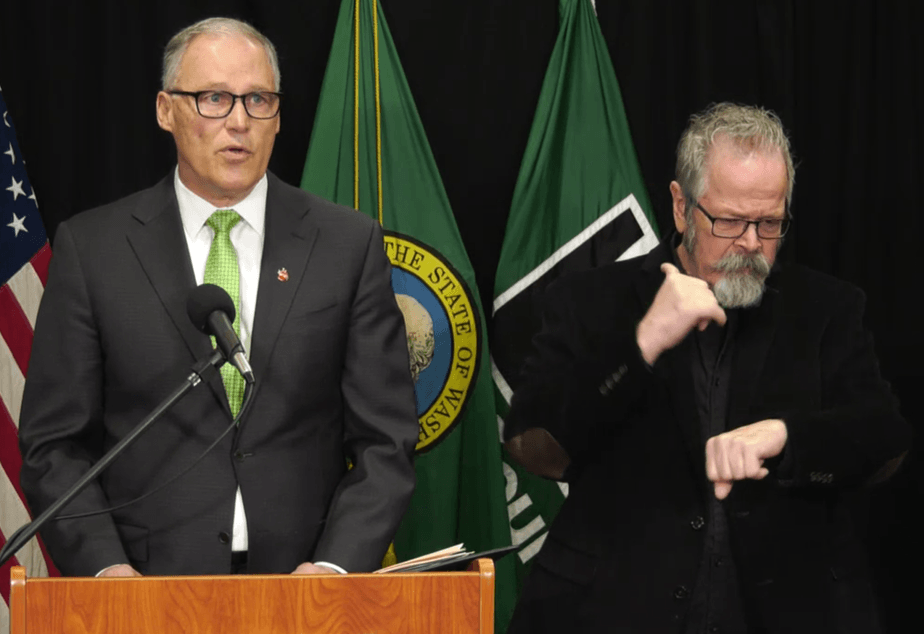
Gov. Jay Inslee announces a ban on large events and gatherings of more than 250 people in King, Snohomish, and Pierce counties on Wednesday, March 11, 2020. CREDIT: King County TV
Homelessness and Housing: At the beginning of the legislative session, a Crosscut-Elway poll showed that homelessness was the top issue of concern among Washington voters. Lawmakers on both sides of the aisle agreed it was a top priority. Gov. Jay Inslee even urged lawmakers to tap into the state’s “rainy day fund” to free up emergency dollars to address the issue. In the end, majority Democrats added $160 million more to the current two-year operating budget to fund additional shelter beds and expand access to affordable housing – without tapping the “rainy day fund.” At the same time, a number of homelessness and housing policy measures passed the Legislature. They include: new tenant protections, including a requirement that landlords accept installment payments for move-in costs and allow a grace period for late rent. A bill to authorize accessory dwelling units also passed, as did a measure to allow counties to impose, by a vote of the county council, a sales and use tax increase to fund affordable housing.
Sports Betting: In what’s been described as the most significant expansion of gambling in Washington in decades, state lawmakers approved legislation to allow sports betting in tribal casinos. The move to permit wagering on professional, out-of-state collegiate and even Olympic competitions follows a 2018 U.S. Supreme Court decision that cleared the way for states beyond Nevada to have sports betting. Washington lawmakers, however, rejected a hard push by Nevada-based Maverick Gaming to allow sports wagering more broadly, including in the 19 non-tribal card rooms the company owns in the state. Assuming Gov. Jay Inslee signs the sports betting bill into law, Washington will join Oregon and 19 others states in allowing sports betting. Maverick has vowed to challenge the law in court.
Hair Discrimination: Washington is poised to join New York, New Jersey and California in banning race-based hair discrimination. The bill sponsored by Democratic state Rep. Melanie Morgan aims to protect certain hairstyles – like Afros, braids, locs and twists – under the state’s anti-discrimination law. Morgan cited examples in other states of youth being required to cut their locs or prevented from walking for graduation because of their hairstyle.
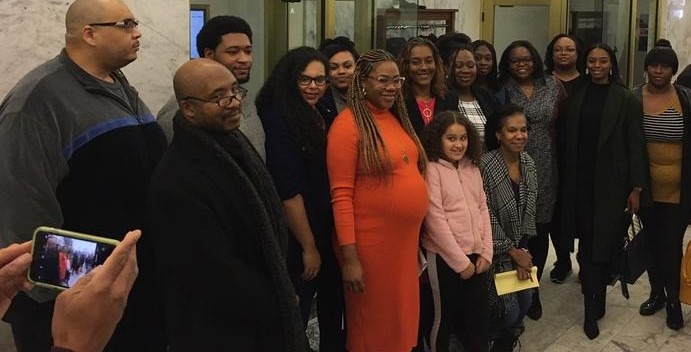
Supporters of a bill to ban race-based hair discrimination pose for a photo following a public hearing in Olympia on Tuesday, Jan. 28, 2020. CREDIT: Austin Jenkins/N3
“We want people who have been discriminated against to be able to go and fight this,” Morgan said. “Right now they have no recourse.” A related measure to allow Native American students to wear traditional tribal regalia at graduation ceremonies also passed the Legislature.
Centralized Background Checks: While gun issues are often controversial, there was bipartisan support this year for a measure to move to an Oregon-style centralized background check system run by the Washington State Patrol (WSP). Currently, background checks for pistols and semi-automatic rifles are conducted by local law enforcement, which can be burdensome and inconsistent. Under the new measure, WSP will create a state background check unit to process background checks for all firearm transfers and purchases. The bill also creates a Washington Background Check Advisory Board to provide input, feedback and oversight of the system. Perhaps the most controversial component of the proposal is that the legislation allows WSP to charge gun purchasers up to $18 for a background check.
Comprehensive Sex Education: Arguably the most controversial bill of the session, majority Democrats (over the vehement objections of Republicans) passed legislation requiring that all public schools teach comprehensive sexual health education. The requirement would be phased in beginning with sixth through twelfth graders in the 2021-22 school year. It would then apply to all students beginning in kindergarten by the 2022-23 school year. The bill requires that the curriculum for fourth through twelfth graders include information about “affirmative consent,” meaning the agreement to engage in sexual activity. The bill allows parents to have their child opt out of the once or twice-a-year teachings. Nonetheless, opponents are furious and vowing a referendum to repeal the bill. In fact, in an unusual move, the top Republican leaders in the House and Senate Republican have already announced the formation of a new committee, Parents for Safe Schools, to petition the governor to veto the bill and, if he doesn’t, pursue a referendum measure.
Boeing Tax Break Repeal: Years ago, when Boeing wanted a tax break to keep building airplanes in Washington, the Legislature complied. When Boeing came to lawmakers this year to say please repeal that tax break, because it’s causing headaches with the World Trade Organization, lawmakers also obliged. Yes, it was a bit of a head-scratcher – a company asking the state to raise its taxes. How often does that happen? But it did. Boeing decided the risk of European tariffs was worse than paying the full freight on Washington’s Business and Occupation tax. So, in the final hours of the session, lawmakers sent the governor a bill that ends the favorable tax rate that Boeing and its parts suppliers currently enjoy. The bill includes what’s been called a “snapback” provision which would allow for the partial reinstatement of the tax break in the event the trade dispute is resolved. However, in order to qualify for the lower rate, Boeing and its suppliers would have to meet new apprenticeship requirements.
Plastic Bag Ban: Invented in the 1960s. Banned in 2020. Over half a century, the single-use plastic shopping bag morphed from modern convenience to environmental pariah. Now Washington is poised to ban single use plastic bags (as well as paper and reusable plastic bags) beginning in 2021, unless they meet certain requirements for recycled content. Retailers will also be required to charge 8-cents for each recycled content plastic or paper bag that is provided. The ban does not extend to plastic bags used in the fruit or vegetable aisles.
WHAT DIED
Death Penalty Repeal: Despite passing the Washington Senate with bipartisan support three years in a row, a bill to repeal Washington’s capital punishment statute once again died in the state House. Going into session, the thinking was the bill had a good shot at getting a vote in the House because newly elected Speaker Laurie Jinkins had previously co-sponsored death penalty repeal legislation. Ultimately, House Democrats discussed the bill behind closed doors—something they hadn’t done before. But the legislation never made it to the floor. Jinkins said there were several considerations, including the fact the death penalty is not currently being carried out in Washington. In 2018, the state Supreme Court struck down the statute finding the death penalty is “imposed in an arbitrary and racially biased manner.” Jinkins said another consideration was the opposition of Republican state Rep. Jenny Graham whose sister was murdered by Green River Killer Gary Ridgway. “I don’t really want to cause people to go through a great deal of pain,” Jinkins said. But she also added that she intends to keep working to move the bill forward in the future.
Gun Magazine Limits: Bills to limit gun magazines to 10 or 15 rounds were a top priority of Gov. Jay Inslee and Attorney General Bob Ferguson this session. In public hearings, lawmakers heard personal stories from victims of mass shootings and their families who pleaded for new restrictions with the goal of reducing the loss of life. Lawmakers also heard from gun rights advocates who argued that a 15 round magazine is not a “large-capacity” magazine. They also said any restriction on magazine size would have a disproportional impact on law-abiding gun owners. The bills made it out of committee in the House and Senate, but didn’t come up for floor votes. In the House, Republicans proposed 120 amendments to the gun magazine bill which Inslee described as a “semi-filibuster.” Republicans countered that Democrats were using them as a scapegoat and were looking for an excuse not to run the bill. This is an issue that could be ripe for a citizen initiative. In recent years, the Alliance for Gun Responsibility sponsored successful measures that raised the age to purchase semi-automatic rifles, created a so-called “red flag” law and expanded background checks to person-to-person gun sales.
King County Head Tax: A big deal was made in late January when Democratic state Sen. Karen Keiser and Democratic state Rep. Nicole Macri introduced companion measures to allow King County to impose a so-called “head tax” on businesses. The money raised would be dedicated to homelessness, affordable housing and behavioral health in the Puget Sound region. Eleven major Seattle-area companies soon signaled support for the measure, including Amazon, Microsoft and Expedia. Soon after, Seattle City Councilmember Kshama Sawant introduced her own local “head tax” proposal. She also showed up at the Capitol with supporters. They warned of efforts by businesses to add a pre-emption clause to the bill in Olympia that would prevent local taxes like the one Sawant was proposing from being imposed. In the end, the Senate version of the bill didn’t even get a hearing. The House bill passed out of the House Finance Committee, but didn’t ever come up for a vote on the floor.
Clean Fuels: In a case of deja vu, one of Gov. Jay Inslee’s top priorities, the so-called clean fuels bill, once again passed the Washington House this year, but died in the Senate – as happened in 2019. The bill aimed to address the largest source of carbon emissions – the transportation sector – by limiting greenhouse gas emissions from transportation fuels. Under the proposal, the carbon intensity of fuels sold in Washington would have had to be 10 percent below 2017 levels by 2028 and 20 percent below 2017 levels by 2035. Opponents, including the oil and gas industry, warned the policy would drive up the cost of a gallon of fuel. But that wasn’t the bill’s biggest hurdle. It was the fact state Sen. Steve Hobbs, the Democratic chair of the Transportation Committee, isn’t a fan of the policy. While he gave the bill a hearing this year and last, it never moved out of his committee.
Data Privacy: Democratic state Sen. Reuven Carlyle hoped the second time would be the charm. Last year, he introduced a sweeping data privacy bill modeled after consumer protections that exist in the European Union. The bill also addressed the use of facial recognition technology. The measure passed the Senate in 2019, but died in the House. This year Carlyle was back with a revised version of his bill and determined to get it passed. He had the support of major players in the technology world, like Microsoft. But as before, the House was wary of the measure. Despite lots of behind the scenes negotiations that continued right up to the end of the session, the House and Senate still couldn’t get on the same page — especially when it came to how the law would be enforced. Carlyle wanted to leave enforcement in the hands of the attorney general. In the House, Rep. Zach Hudgins wanted to give individuals the right to pursue legal action against companies. “The impasse remains a question of enforcement,” Carlyle said in a statement. A separate, hard-fought proposal to regulate the use of facial recognition technology by police and other government entities did make it through just prior to the Legislature adjourning.

With a new law enacted in December 2019, anyone under 21 can no longer legally buy cigarettes, cigars or any other tobacco products. It also applies to vaping products that heat a liquid containing nicotine. CREDIT: Mark Lennihan/AP
Flavored Vaping Ban: Last September, in the wake of lung injury deaths from vaping, Gov. Jay Inslee announced a 120-day ban on flavored vaping products. He also called on lawmakers to make the ban permanent when they convened in January. But even with the governor’s order set to expire in February, lawmakers showed no indication they felt an urgent need to act. By then, the Centers for Disease Control and Prevention had identified vitamin E acetate as the culprit ingredient causing the deaths and illnesses nationwide. While vaping regulation bills were introduced and public hearings held, the issue didn’t come up for votes on the floors of the House or Senate — until the last day of the legislative session when the issue was suddenly revived. But it wasn’t to be. While the Washington Senate approved a more narrow bill to ban the sale of disposable flavored products and those with vitamin E acetate, the House did not take up the measure and it died.
Matt Shea Expulsion: In December, an explosive House investigation was released to the public that concluded Republican state Rep. Matt Shea, of Spokane Valley, was a leader in the Patriot Movement who had played a role in three armed confrontations across the American West, including the takeover of the Malheur National Wildlife Refuge in Oregon in 2016. Shea, who refused to cooperate with investigators, called the report’s findings “offensive” and a “sham” and said he had been denied due process. He also refused calls for him to resign. Nonetheless, House Republicans immediately suspended Shea from their caucus and stripped him of his committee assignments. Majority Democrats wanted to go further. House Speaker Laurie Jinkins said if Shea wouldn’t resign he should be expelled – a nearly unprecedented step that would require a two-thirds vote of the House. Ultimately, Republicans didn’t support expulsion and Democrats seemed to conclude that pursuing additional action against Shea – without bipartisan support – was not feasible. In late February, Jinkins issued a statement that said: “There are 20 days left in this session, and I’m focused on addressing the needs across our state and finishing on time.” Jinkins did leave open the possibility of the House taking future action against Shea who is running for re-election this year.
Related Stories:
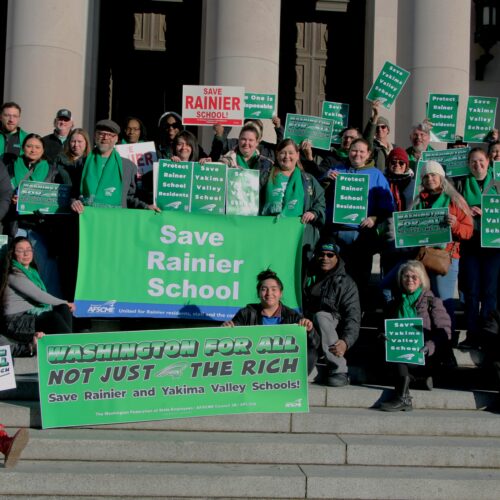
State considers closure of residential facilities for people with disabilities
Ever since he started working at Rainier School in Buckley, Washington, Willis McNabb has been hearing that the state was going to close it. This time, he said it feels more real.
“I’ve never been so worried as I am today,” McNabb said.
Since 1991, McNabb has worked at Rainier, which gives people with intellectual and developmental disabilities a place to find community, learn, work and receive comprehensive health treatment.
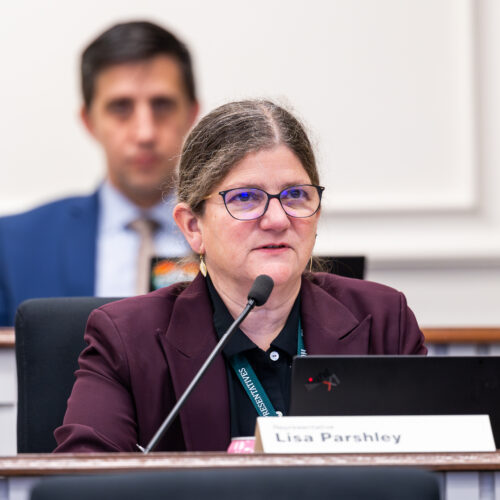
Washington bills attempt to give public workers power to bargain on AI
There are only so many things employees get to have a say over in their jobs. Which laptops or messaging app your office uses might not be your call.
For a while, decisions on the use of technology in the workplace have been up to management for public workers in Washington state, thanks to a law passed in 2002. But now, some lawmakers want to pass an exemption that would allow public sector employees to bargain on one broad and ever-changing technology — artificial intelligence.

Hundreds rally in support of immigrants at Washington state Capitol
People shouted “si se puede” or “yes we can” on the Washington state Capitol steps during an immigrants’ rights rally on Thursday, Jan. 30, 2025. (Credit: Jacquelyn Jimenez Romero /















